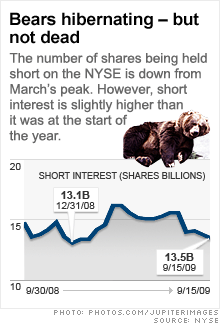Market is pulling down the shorts
Short sellers profited handsomely when bank stocks tanked. But as the market heads higher, bears may actually be helping to fuel the rally. That's healthy.


NEW YORK (CNNMoney.com) -- At this time a year ago, short sellers were branded scapegoats by many who were not happy to watch the value of their stock portfolios rapidly dwindle away.
Short sellers (or shorts for uh, short) bet on stock prices falling, and they have often been accused of manipulating the market.
During the past year, regulators cracked down on the short selling of financial stocks due to concerns that shorts were unfairly targeting the shares of big banks like Citigroup (C, Fortune 500), Bank of America (BAC, Fortune 500) and Goldman Sachs (GS, Fortune 500). At one point, short selling in financials was temporarily banned.
Well, the Securities and Exchange Commission is exploring the issue again this week in a two-day meeting.
To be sure, there are cases of abuse and downright fraud. So some rule changes make sense, like the one against "naked" short-selling. When you sell a stock short, you're supposed to borrow shares and then sell them, with the hopes of buying them back at a cheaper price. In a "naked" transaction, you don't actually borrow the shares.
The reinstitution of the uptick rule, which would mean that investors can only short a stock after it rose, also is something worth considering.
But guess what? The shorts aren't the reason why financial stocks cratered last year. Many banks deserved to be sold because their balance sheets had more holes than a slice of Swiss cheese, not because devious shorts were spreading nasty unsubstantiated rumors about how bad their books were.
So overreacting and imposing too many restrictions on short sellers is not a good idea.
"Short selling is as old as the markets themselves. You need people on both sides to make a market," said Richard Ross, global technical strategist with Auerbach Grayson, a broker dealer based in New York. "Short selling is a healthy evil. It's not really nefarious or sinister. Regulating shorts because markets go down may be a case of the pendulum swinging too far."
What's more, prohibitively tough rules on short selling could be misguided because they might have unintended consequences. For all the bad press that shorts get, short sellers probably deserve some credit for how well stocks have done lately.
While short interest, the number of shares being held short that have yet to be bought back, has declined from peak levels back in March, bears haven't taken a complete vacation during this now nearly seven-month long rally. The level of short interest on the NYSE as of mid-September was a bit higher than where it stood at the end of 2008.
And because short interest remains relatively high, that means that some shorts have been forced to buy stocks, something known as covering their positions.
In some instances, shorts may be waiting for short-term pullbacks to cover their positions in order to help minimize their potential losses. So short sellers may help to keep a small dip from mushrooming into a much bigger sell-off.
"One thing everybody forgets is that at the end of the day, when the market turns up, shorts are getting caught and are being forced to cover and buy," said Patrick Galley, manager of the RiverNorth Core Opportunity fund in Chicago. "As more shorts may realize that this market could be for real, that helps push momentum for stocks even further."
In the case of some individual stocks, something known as a short squeeze may be playing out. A short squeeze happens when a heavily shorted stock starts to head higher and shorts rush to cover their position due to fears that they'll suffer massive losses if they don't buy.
David Kelson, portfolio manager with Talon Asset Management in Chicago, said that appears to be happening with the insurance giant AIG (AIG, Fortune 500) and casino operator Las Vegas Sands (LVS). Nearly 20% of each company's available shares outstanding were held short as of mid-September, a fairly high percentage.
Shares of AIG have surged nearly 550% since the market's March lows while shares of Las Vegas Sands are up almost 1,200%
"If you look at stocks with the highest short interest, they have done disproportionately well compared to the overall market. That is a contributor to what's going on," Kelson said.
But how much longer can this last? Short sellers are often right about a stock. They just might not be right at the right time. And many of the companies that shorts are betting against have large debt loads and other significant financial problems. That could eventually catch up to them.
Still, the shorts have largely been waging a losing battle this year. And just as it was an overreaction to blame shorts when stocks were going down a year ago, it's not fair to say that the only reason the markets are heading higher is because of short covering.
Stocks have gone up due to some signs of improvement in the overall economy as well as for corporate profits. If evidence of an economic and earnings recovery continue to mount, that's going to be the real reason that stocks are heading higher. That said, it won't hurt that such evidence would likely put even more pressure on the shorts.
"Short covering is definitely part of the fuel for this rally, but I wouldn't overstate its importance," Ross said. "Still, it's not a great environment to be a short seller right now."
Talkback: Should regulators crack down further on short selling? Share your comments below. ![]()


